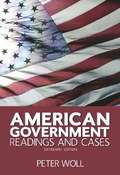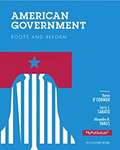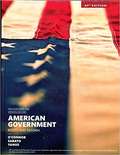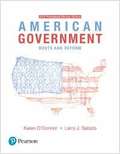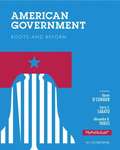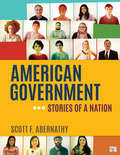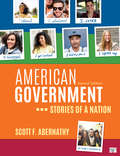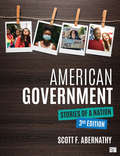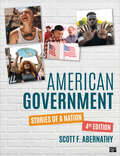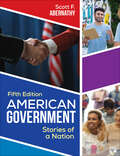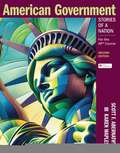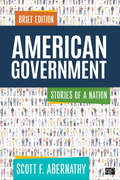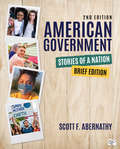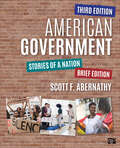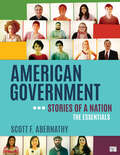- Table View
- List View
American Government: Readings and Cases, 16th Edition
by Peter WollThe 16th edition of this reader continues to provide a balance of classic and current readings and cases that illustrate important concepts in American government. Preceding each set of readings is an in-depth yet accessible analysis of issues raised in the readings, designed to foster students' critical thinking. For this edition, there is a new section on presidential prerogative powers concerning military tribunals, a new anti-Federalist paper, and a 2003 Supreme Court decision. The book can be used as an ancillary or a core text.
American Government: Roots And Reform,AP Edition
by Larry J. Sabato Karen J. O'Connor Alixandra B. YanusAmerican Government
American Government: Roots and Reform
by Karen O'Connor Larry J. Sabato Alixandra B. YanusAmerican Government: Roots and Reform Twelfth Edition, AP Edition, 2014 Elections and Updates Edition by Karen O'Connor, Larry J. Sabato, and Alixandra B. Yanus.
American Government: Roots and Reform
by Karen O'Connor Larry SabatoAmerican Government: Roots and Reform, 2016 Presidential Election Edition by Karen O'Connor and Larry Sabato.
American Government: Roots and Reform
by PearsonIn American Government the authors try to examine how the United States is governed today by looking not just at present structures and behavior but also at the Framers' intentions and how they have been implemented and adapted over the years.
American Government: Roots and Reform, 2012 Election Edition
by Karen O'Connor Larry J. Sabato Alixandra B. YanusAmerican Government: Roots and Reform, 2012 Election Edition explores how the origins of American government affect the issues facing the United States today. The text offers the strongest coverage of history and current events. This approach encourages students to study present political structures and behaviors in full constitutional and historical context. The text helps students learn how our government evolved and how they can become more informed citizens. Most importantly, it encourages them to discover that politics can be-and most often is-a good thing. This text features full integration with the New MyPoliSciLab. MyPoliSciLab includes a wide array of resources to encourage students to look at American politics like a political scientist and analyze current political issues. This program provides a better teaching and learning experience-for you and your students.
American Government: Stories of a Nation
by Scott F. AbernathyReal People. Real Stories. Real Politics. Politics involves people, from many backgrounds, struggling to make their voices heard. Real people, telling their stories, reflect our ideals, choices, and collective experiences as a nation. In American Government: Stories of a Nation, author Scott Abernathy tunes in to these voices, showing how our diverse ideas shape the way we participate and behave, the laws we live by, and the challenges we face. Each chapter features real stories illustrating how the American political system is the product of strategies, calculations, and miscalculations of countless individuals. Students learn the nuts and bolts of political science through these compelling stories. Learning concepts in context is a tested learning technique that works to help ideas stick. The key concepts are memorable because they are tied to real politics, where students see political action and political choices shaping how institutions advance or impede the fulfillment of fundamental ideas. Not only will all students see themselves reflected in the pages, but they will come to understand that they, too, are strategic players in American politics, with voices that matter.
American Government: Stories of a Nation
by Scott F. AbernathyReal People. Real Stories. Real Politics. Politics involves people, from many backgrounds, struggling to make their voices heard. Real people, telling their stories, reflect our ideals, choices, and collective experiences as a nation. In American Government: Stories of a Nation, author Scott Abernathy tunes in to these voices, showing how our diverse ideas shape the way we participate and behave, the laws we live by, and the challenges we face. Each chapter features real stories illustrating how the American political system is the product of strategies, calculations, and miscalculations of countless individuals. Students learn the nuts and bolts of political science through these compelling stories. Learning concepts in context is a tested learning technique that works to help ideas stick. The key concepts are memorable because they are tied to real politics, where students see political action and political choices shaping how institutions advance or impede the fulfillment of fundamental ideas. Not only will all students see themselves reflected in the pages, but they will come to understand that they, too, are strategic players in American politics, with voices that matter.
American Government: Stories of a Nation
by Scott F. AbernathyIn the Second Edition of American Government, author Scott F. Abernathy tunes in to the voices of all Americans, showing how our diverse ideas shape the way we participate and behave, the laws we live by, and the challenges we face. From the Constitutional Convention to Ferguson, Missouri, each chapter features rich, personal narratives that illustrate how the American political system is the product of strategies, calculations, and miscalculations of countless individuals. It focuses on real people, the actions they take, the struggles they face, and how their choices influence outcomes. The key concepts are memorable because they are tied to real politics, where students see political action and political choices shaping how institutions advance or impede the fulfillment of fundamental ideas. Participation is at the heart of this groundbreaking new text, with ample background on how and why to participate. Not only will all students see themselves reflected in the pages, but they will come to understand that they, too, are strategic players in American politics, with voices that matter.
American Government: Stories of a Nation
by Scott F. AbernathyIn the Second Edition of American Government, author Scott F. Abernathy tunes in to the voices of all Americans, showing how our diverse ideas shape the way we participate and behave, the laws we live by, and the challenges we face. From the Constitutional Convention to Ferguson, Missouri, each chapter features rich, personal narratives that illustrate how the American political system is the product of strategies, calculations, and miscalculations of countless individuals. It focuses on real people, the actions they take, the struggles they face, and how their choices influence outcomes. The key concepts are memorable because they are tied to real politics, where students see political action and political choices shaping how institutions advance or impede the fulfillment of fundamental ideas. Participation is at the heart of this groundbreaking new text, with ample background on how and why to participate. Not only will all students see themselves reflected in the pages, but they will come to understand that they, too, are strategic players in American politics, with voices that matter.
American Government: Stories of a Nation
by Scott F. Abernathy"The main strength of this book is that it presents a ‘human’ side to American Government that challenges students to think critically while still presenting the ‘teaching’ side with objectives, self-tests, and chapter reviews." —Kathleen Barrett, University of West Georgia In the Third Edition of American Government: Stories of a Nation, author Scott F. Abernathy tunes in to the voices of all Americans, showing how our diverse ideas shape the way we participate and behave, the laws we live by, and the challenges we face. From the Constitutional Convention to the 2020 presidential election, each chapter features rich, personal narratives that illustrate how the American political system is the product of strategies, calculations, and miscalculations of countless individuals. It focuses on real people, the actions they take, the struggles they face, and how their choices influence outcomes. The key concepts are memorable because they are tied to real politics, where students see political action and political choices shaping how institutions advance or impede the fulfillment of fundamental ideas. Participation is at the heart of this groundbreaking new text, with ample background on how we participate and why. Not only will all students see themselves reflected in the pages, but they will come to understand that they, too, are strategic players in American politics, with voices that matter. This title is accompanied by a complete teaching and learning package. Contact your SAGE representative to request a demo. Digital Option / Courseware SAGE Vantage is an intuitive digital platform that delivers this text’s content and course materials in a learning experience that offers auto-graded assignments and interactive multimedia tools, all carefully designed to ignite student engagement and drive critical thinking. Built with you and your students in mind, it offers simple course set-up and enables students to better prepare for class. Assignable Video with Assessment Assignable video (available with SAGE Vantage) is tied to learning objectives and curated exclusively for this text to bring concepts to life. Watch a sample video now. LMS Cartridge: Import this title’s instructor resources into your school’s learning management system (LMS) and save time. Don’t use an LMS? You can still access all of the same online resources for this title via the password-protected Instructor Resource Site. CQ Press Lecture Spark: Designed to save you time and ignite student engagement, these free weekly lecture launchers focus on current event topics tied to key concepts in American Government. Access this week’s topic.
American Government: Stories of a Nation
by Scott F. Abernathy"The main strength of this book is that it presents a ‘human’ side to American Government that challenges students to think critically while still presenting the ‘teaching’ side with objectives, self-tests, and chapter reviews." —Kathleen Barrett, University of West Georgia In the Third Edition of American Government: Stories of a Nation, author Scott F. Abernathy tunes in to the voices of all Americans, showing how our diverse ideas shape the way we participate and behave, the laws we live by, and the challenges we face. From the Constitutional Convention to the 2020 presidential election, each chapter features rich, personal narratives that illustrate how the American political system is the product of strategies, calculations, and miscalculations of countless individuals. It focuses on real people, the actions they take, the struggles they face, and how their choices influence outcomes. The key concepts are memorable because they are tied to real politics, where students see political action and political choices shaping how institutions advance or impede the fulfillment of fundamental ideas. Participation is at the heart of this groundbreaking new text, with ample background on how we participate and why. Not only will all students see themselves reflected in the pages, but they will come to understand that they, too, are strategic players in American politics, with voices that matter. This title is accompanied by a complete teaching and learning package. Contact your SAGE representative to request a demo. Digital Option / Courseware SAGE Vantage is an intuitive digital platform that delivers this text’s content and course materials in a learning experience that offers auto-graded assignments and interactive multimedia tools, all carefully designed to ignite student engagement and drive critical thinking. Built with you and your students in mind, it offers simple course set-up and enables students to better prepare for class. Assignable Video with Assessment Assignable video (available with SAGE Vantage) is tied to learning objectives and curated exclusively for this text to bring concepts to life. Watch a sample video now. LMS Cartridge: Import this title’s instructor resources into your school’s learning management system (LMS) and save time. Don’t use an LMS? You can still access all of the same online resources for this title via the password-protected Instructor Resource Site. CQ Press Lecture Spark: Designed to save you time and ignite student engagement, these free weekly lecture launchers focus on current event topics tied to key concepts in American Government. Access this week’s topic.
American Government: Stories of a Nation
by Scott F. AbernathyAmerican government is not just one story—it′s many stories. Our stories. And they are still being told. In the Fourth Edition of American Government: Stories of a Nation, author Scott F. Abernathy tunes in to the voices of all Americans, showing how our diverse ideas shape the way we participate and behave, the laws we live by, and the challenges we face. His storytelling approach brings the core concepts of government to life, making them meaningful and memorable, and allows all students to see themselves reflected in the pages. Participation is at the heart of this groundbreaking text, with ample background on how we participate and why. Not only will all students see themselves reflected in the pages, but they will come to understand that they, too, are strategic players in American politics, with voices that matter. This title is accompanied by a complete teaching and learning package. Contact your SAGE representative to request a demo. Learning Platform / Courseware SAGE Vantage is an intuitive learning platform that integrates quality SAGE textbook content with assignable multimedia activities and auto-graded assessments to drive student engagement and ensure accountability. Unparalleled in its ease of use and built for dynamic teaching and learning, Vantage offers customizable LMS integration and best-in-class support. It′s a learning platform you, and your students, will actually love. Learn more. Assignable Video with Assessment Assignable video (available in SAGE Vantage) is tied to learning objectives and curated exclusively for this text to bring concepts to life. Watch a sample video now. LMS Cartridge: Import this title′s instructor resources into your school′s learning management system (LMS) and save time. Don′t use an LMS? You can still access all of the same online resources for this title via the password-protected Instructor Resource Site. Learn more.
American Government: Stories of a Nation
by Scott F. AbernathyAmerican government is not just one story—it′s many stories. Our stories. And they are still being told. In the Fourth Edition of American Government: Stories of a Nation, author Scott F. Abernathy tunes in to the voices of all Americans, showing how our diverse ideas shape the way we participate and behave, the laws we live by, and the challenges we face. His storytelling approach brings the core concepts of government to life, making them meaningful and memorable, and allows all students to see themselves reflected in the pages. Participation is at the heart of this groundbreaking text, with ample background on how we participate and why. Not only will all students see themselves reflected in the pages, but they will come to understand that they, too, are strategic players in American politics, with voices that matter.
American Government: Stories of a Nation
by Scott F. AbernathyAmerican government is not just one story—it’s many stories. Our stories. And they are still being told. In American Government: Stories of a Nation, Scott F. Abernathy tunes into the diverse perspectives and political persuasions involved in American politics. This balanced approach encourages students to actively engage with the material while facilitating a thoughtful exploration of important themes in politics, governance, and current events. Known for addressing issues in a way that is both relatable and solidly grounded in research, the Fifth Edition delivers new ways for students to understand and participate in politics.
American Government: Stories of a Nation
by Scott F. AbernathyAmerican government is not just one story—it’s many stories. Our stories. And they are still being told. In American Government: Stories of a Nation, Scott F. Abernathy tunes into the diverse perspectives and political persuasions involved in American politics. This balanced approach encourages students to actively engage with the material while facilitating a thoughtful exploration of important themes in politics, governance, and current events. Known for addressing issues in a way that is both relatable and solidly grounded in research, the Fifth Edition delivers new ways for students to understand and participate in politics.
American Government: Stories of a Nation for the AP Course
by Karen Waples Scott AbernathyThis new offering from AP teacher Karen Waples and college professor Scott Abernathy is tailor-made to help teachers and students transition to the redesigned AP U. S. Government and Politics course. Carefully aligned to the course framework, this brief book is loaded with instructional tools to help you and your students meet the demands of the new course, such as integrated skills instruction, coverage of required cases and documents, public policy threaded throughout the book, and AP practice after every chapter and unit, all in a simple organization that will ease your course planning and save you time.
American Government: Stories of a Nation, Brief Edition
by Scott F. AbernathyAmerican government is not just one story—it’s many stories. Our stories. And they are still being told. In American Government: Stories of a Nation, author Scott Abernathy tunes in to the voices of America’s people, showing how diverse ideas throughout our nation’s history have shaped our political institutions, our identities, the way we participate and behave, the laws we live by, and the challenges we face. His storytelling approach brings the core concepts of government to life, making them meaningful and memorable, and allowing all students to see themselves reflected in the pages. For the new Brief Edition, Abernathy has carefully condensed and updated the content from the Full version, giving you the information you need--and the stories you can relate to--in a more concise, value-oriented package.
American Government: Stories of a Nation, Brief Edition
by Scott F. AbernathyAmerican government is not just one story—it’s many stories. Our stories. And they are still being told. In American Government: Stories of a Nation, author Scott Abernathy tunes in to the voices of America’s people, showing how diverse ideas throughout our nation’s history have shaped our political institutions, our identities, the way we participate and behave, the laws we live by, and the challenges we face. His storytelling approach brings the core concepts of government to life, making them meaningful and memorable, and allowing all students to see themselves reflected in the pages. For the new Brief Edition, Abernathy has carefully condensed and updated the content from the Full version, giving you the information you need--and the stories you can relate to--in a more concise, value-oriented package.
American Government: Stories of a Nation, Brief Edition
by Scott F. AbernathyAmerican government is not just one story—it’s many stories. Our stories. And they are still being told. In the Second Edition of American Government: Stories of a Nation, Brief Edition, author Scott Abernathy tunes in to the voices of America’s people, showing how diverse ideas throughout our nation’s history have shaped our political institutions, our identities, the way we participate and behave, the laws we live by, and the challenges we face. His storytelling approach brings the core concepts of government to life, making them meaningful and memorable, and allows all students to see themselves reflected in the pages. Carefully condensed from the full version by Scott Abernathy, American Government, Brief Edition, gives your students all the information they need—and the stories they relate to—in a more concise, value-oriented package. This title is accompanied by a complete teaching and learning package. Contact your SAGE representative to request a demo. Digital Option / Courseware SAGE Vantage is an intuitive digital platform that delivers this text’s content and course materials in a learning experience that offers auto-graded assignments and interactive multimedia tools, all carefully designed to ignite student engagement and drive critical thinking. Built with you and your students in mind, it offers simple course set-up and enables students to better prepare for class. Assignable Video with Assessment Assignable video (available with SAGE Vantage) is tied to learning objectives and curated exclusively for this text to bring concepts to life. Watch a sample video now. LMS Cartridge: Import this title’s instructor resources into your school’s learning management system (LMS) and save time. Don’t use an LMS? You can still access all of the same online resources for this title via the password-protected Instructor Resource Site. Learn more. CQ Press Lecture Spark: Designed to save you time and ignite student engagement, these free weekly lecture launchers focus on current event topics tied to key concepts in American Government. Access this week’s topic.
American Government: Stories of a Nation, Brief Edition
by Scott F. AbernathyAmerican government is not just one story—it’s many stories. Our stories. And they are still being told. In the Second Edition of American Government: Stories of a Nation, Brief Edition, author Scott Abernathy tunes in to the voices of America’s people, showing how diverse ideas throughout our nation’s history have shaped our political institutions, our identities, the way we participate and behave, the laws we live by, and the challenges we face. His storytelling approach brings the core concepts of government to life, making them meaningful and memorable, and allows all students to see themselves reflected in the pages. Carefully condensed from the full version by Scott Abernathy, American Government, Brief Edition, gives your students all the information they need—and the stories they relate to—in a more concise, value-oriented package. This title is accompanied by a complete teaching and learning package. Contact your SAGE representative to request a demo. Digital Option / Courseware SAGE Vantage is an intuitive digital platform that delivers this text’s content and course materials in a learning experience that offers auto-graded assignments and interactive multimedia tools, all carefully designed to ignite student engagement and drive critical thinking. Built with you and your students in mind, it offers simple course set-up and enables students to better prepare for class. Assignable Video with Assessment Assignable video (available with SAGE Vantage) is tied to learning objectives and curated exclusively for this text to bring concepts to life. Watch a sample video now. LMS Cartridge: Import this title’s instructor resources into your school’s learning management system (LMS) and save time. Don’t use an LMS? You can still access all of the same online resources for this title via the password-protected Instructor Resource Site. Learn more. CQ Press Lecture Spark: Designed to save you time and ignite student engagement, these free weekly lecture launchers focus on current event topics tied to key concepts in American Government. Access this week’s topic.
American Government: Stories of a Nation, Brief Edition
by Scott F. AbernathyAmerican government is not just one story—it′s many stories. Our stories. And they are still being told. In American Government: Stories of a Nation, Brief Third Edition, author Scott Abernathy tunes in to the voices of America′s people, showing how diverse ideas throughout our nation′s history have shaped our political institutions, our identities, the way we participate and behave, the laws we live by, and the challenges we face. His storytelling approach brings the core concepts of government to life, making them meaningful and memorable, and allows all students to see themselves reflected in the pages. Carefully condensed from the full version by Scott Abernathy, American Government, Brief Third Edition, gives your students all the information they need—and the stories they relate to—in a more concise, value-oriented package.
American Government: Stories of a Nation, Brief Edition
by Scott F. AbernathyAmerican government is not just one story—it′s many stories. Our stories. And they are still being told. In American Government: Stories of a Nation, Brief Third Edition, author Scott Abernathy tunes in to the voices of America′s people, showing how diverse ideas throughout our nation′s history have shaped our political institutions, our identities, the way we participate and behave, the laws we live by, and the challenges we face. His storytelling approach brings the core concepts of government to life, making them meaningful and memorable, and allows all students to see themselves reflected in the pages. Carefully condensed from the full version by Scott Abernathy, American Government, Brief Third Edition, gives your students all the information they need—and the stories they relate to—in a more concise, value-oriented package.
American Government: Stories of a Nation, Essentials Edition
by Scott F. AbernathyReal People. Real Stories. Real Politics. Politics involves people, from many backgrounds, struggling to make their voices heard. Real people, telling their stories, reflect our ideals, choices, and collective experiences as a nation. In American Government: Stories of a Nation, author Scott Abernathy tunes in to these voices, showing how our diverse ideas shape the way we participate and behave, the laws we live by, and the challenges we face. Each chapter features real stories illustrating how the American political system is the product of strategies, calculations, and miscalculations of countless individuals. Students learn the nuts and bolts of political science through these compelling stories. Learning concepts in context is a tested learning technique that works to help ideas stick. The key concepts are memorable because they are tied to real politics, where students see political action and political choices shaping how institutions advance or impede the fulfillment of fundamental ideas. Not only will all students see themselves reflected in the pages, but they will come to understand that they, too, are strategic players in American politics, with voices that matter. Just like the Full version, The Essentials edition is perfect for instructors who don’t wish to cover the last three chapters on policy.
American Government: Stories of a Nation, Essentials Edition
by Scott F. AbernathyReal People. Real Stories. Real Politics. Politics involves people, from many backgrounds, struggling to make their voices heard. Real people, telling their stories, reflect our ideals, choices, and collective experiences as a nation. In American Government: Stories of a Nation, author Scott Abernathy tunes in to these voices, showing how our diverse ideas shape the way we participate and behave, the laws we live by, and the challenges we face. Each chapter features real stories illustrating how the American political system is the product of strategies, calculations, and miscalculations of countless individuals. Students learn the nuts and bolts of political science through these compelling stories. Learning concepts in context is a tested learning technique that works to help ideas stick. The key concepts are memorable because they are tied to real politics, where students see political action and political choices shaping how institutions advance or impede the fulfillment of fundamental ideas. Not only will all students see themselves reflected in the pages, but they will come to understand that they, too, are strategic players in American politics, with voices that matter. Just like the Full version, The Essentials edition is perfect for instructors who don’t wish to cover the last three chapters on policy.
